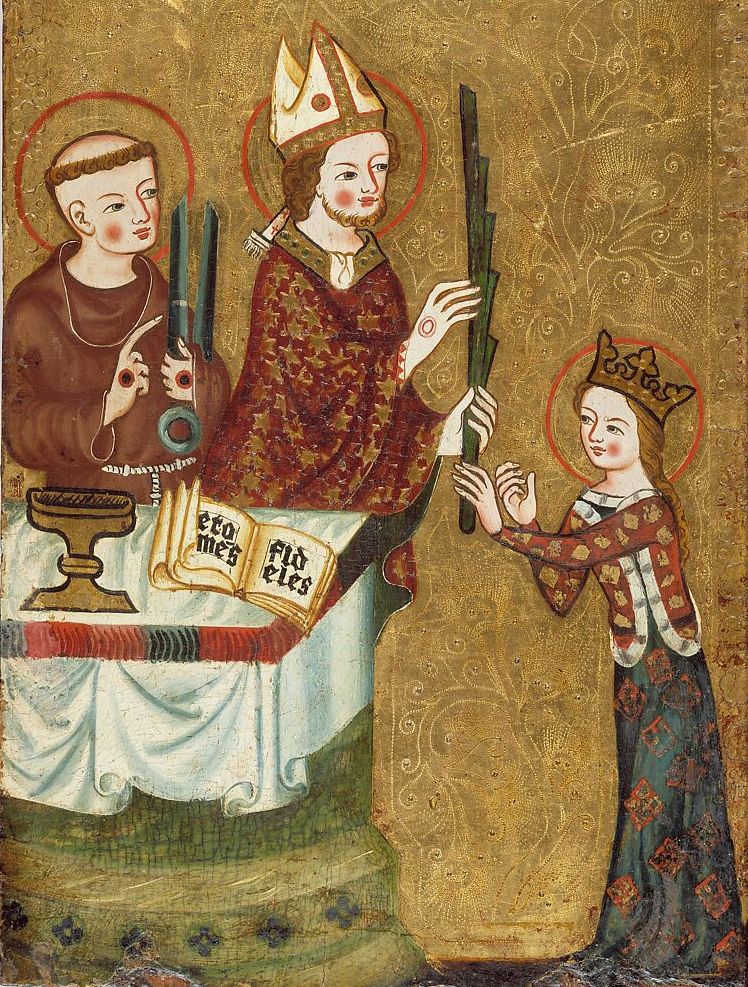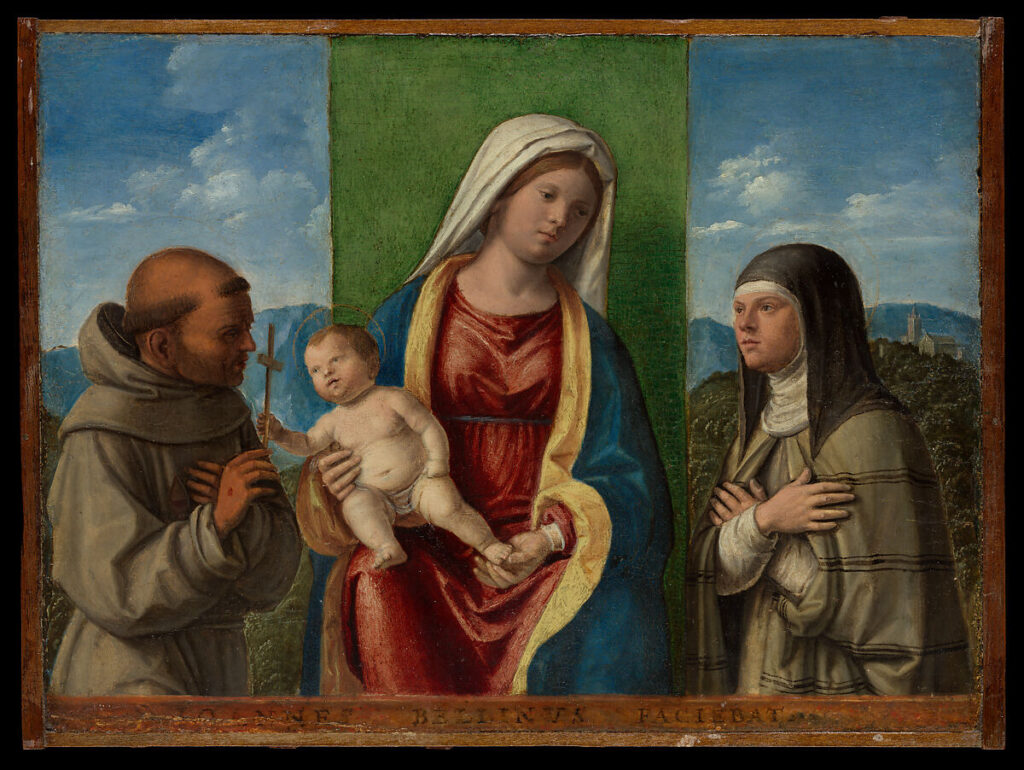Feast Day: August 11
My first encounter with Saint Clare came on a Franciscan volunteer retreat where we stepped inside the outer rooms of a contemplative house of nuns. The Poor Clares lived there behind cloister walls seeking God in community, poverty, and prayer. They welcomed us into their holy quiet. Only later did I learn that Clare, the medieval founder of the order, also had a side job as the patron saint of television. She seemed a surprising choice.

St. Clare: Partner of St. Francis
Clare grew up in privileged circumstances, a lady in the elegant Italian household of a noble family of thirteenth-century Assisi. She was a beautiful, quietly thoughtful, and rich teenager—the perfect marriage prospect. She, however, had a hunger inside her for something else. A hidden something. Then, one Sunday in the cathedral of Assisi, she watched a ragged, dirty man stand up in front of the congregation and begin to preach. His words and his witness changed her life.
Clare had heard of this man named Francis. Everyone in town knew how this disowned son of a rich merchant had returned from war and captivity a changed man who, after a rather public confrontation with his dad, stumbled forward into a simple proposition. He decided to literally carry out Jesus’ command to sell everything, to live without money or possessions, and to follow Him in poverty and suffering to preach penance and the Gospel. Clare wanted that with all her heart. When her family stood in her way, she ran away in the night. Francis received her. In front of witnesses, she took vows of poverty and celibacy, cutting her beautiful hair off in sign of her new life. Her family made a fuss when they learned what she had done, but Clare convinced the bishop to support her in her new life.
Clare wanted to live like Francis and his early companions: homeless, sheltering in ruined buildings or the street, begging for food or doing day labor, never touching money or claiming to own anything. In the end, she had to compromise. The bishop and others in authority judged living in the street to be too dangerous for a woman; given the extra threats women face even today, they unfortunately had reason for their judgment. They worried too about the scandal of supposedly celibate men and women living together. Given the tendency of some modern readers to reduce Francis and Clare’s deep spiritual relationship to a merely romantic one, again they had reason to fear.
So Clare and the women who joined her formed a cloistered community, living their vocation of poverty within the walls of a convent loaned to them. There they followed Jesus, preaching the Gospel by their example, working for the Church through prayer, and building hidden gardens of virtue in their souls. Clare, unlike Francis, proved to be a skilled administrator and politician who vigorously defended the unique charisms of her order as it spread internationally. The force of her personality and her undisputed holiness made this new life possible for her and countless other women.
The Patron of Television
How did a medieval woman dedicated to poverty become the patron saint of television? It stems from one of the little miracles that God granted Clare. As she grew older, her penances and austerities began to take a toll on her body. On Christmas Eve, the year before her death, she lay on her bed too ill to go to the Christmas Vigil. Her sisters left to go to Church and she remained behind, mediating on the mystery of God’s humility in coming down from Heaven to become poor and helpless in his human mother’s arms. Then, as she thought about the mass and looked at the wall in front of her, she saw it. The Church, the congregation, the priests, the singing, everything right there before her eyes. She heard the Gospel proclaimed and saw Jesus come down again to be held in the priest’s hand in the form of bread.

In 1958, Pope Pius XII named Clare the patron saint of the new media of television. She had seen the first televised mass after all. Given how much comfort the elderly, ill, and homebound have received from televised masses (even before COVID), I think he chose wisely.
Obviously television does more than show masses. Sometimes television producers show helpful things that build us up and sometimes, perhaps more often, they show us things that increase hate, envy, lust, or despair. It isn’t a new problem. The name “Francis” actually was a nickname meaning the “Little Frenchman” that his family gave the young Francis after he fell in love with the new popular culture of the troubadours. He dove into their stories of brave knights and romantic love, ignoring how those tales promoted a culture of violence and adultery. Yet Francis found dreams in them that would carry him on past the limited secular viewpoint to a higher way of life. These stories made him long to be a hero recognized for his service to a great lord. God transformed that longing in Francis from the heroism of battle to the heroism of joyful sacrifice serving the Kingdom of God. The troubadour stories had taught him that love for a lady crystalized into a perfect jewel only through suffering. God elevated that longing for a passion perfected in endurance from one directed at a single woman to one serving all God’s children through love of “Lady Poverty” (Francis’ name for the humble life of complete self-giving modeled by Christ).
Television and St. Clare in our Hearts
I think we enjoy popular media because it taps into genuinely good longings we have. Television often gets parts wrong. It mistakes celebrity and wealth for happiness. It confuses lust with love. It confuses violence with strength. It makes lots of mistakes, but the desire is there for something good. With God’s grace, we can follow Francis in making that transition, lifting our eyes from imitation goods to the real thing. Like Clare hearing Francis’ preaching, we can learn to recognize the love, peace, and goodness for which our hearts truly long. Then we can take on the sacrifice and poverty that let God fill us with the joy for which we are made.
May our hearts be open through St. Clare’s prayers to learn how God wants to fill our hearts. May the television and other media that we consume work to make us better and more loving people. And may we have the grace to discern when media does not improve us (or give us morally neutral refreshment), but rather directs us down unhealthy paths.
If you have a response, thoughts, or questions, please comment at the bottom of the page. Consider subscribing below to get weekly email notifications about new reflections and other news.


